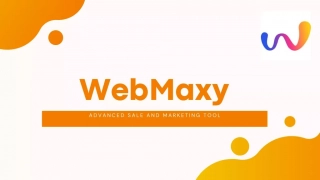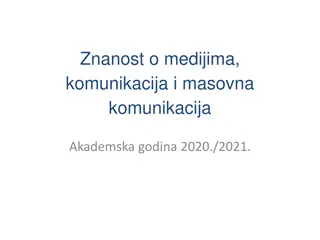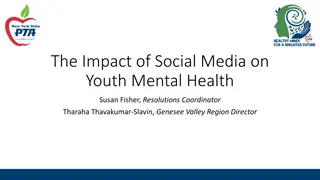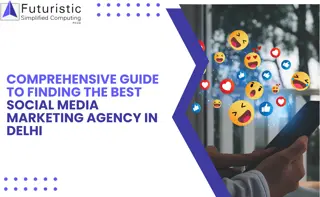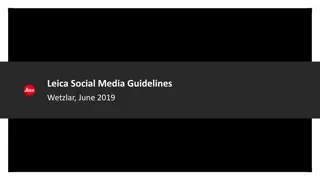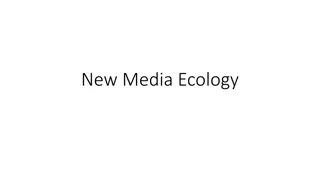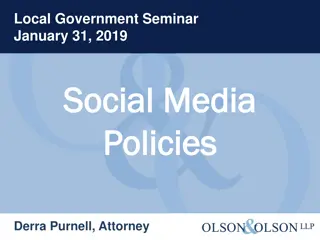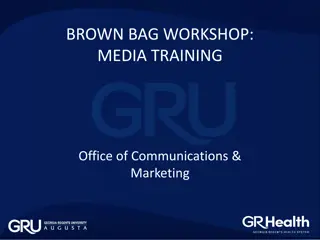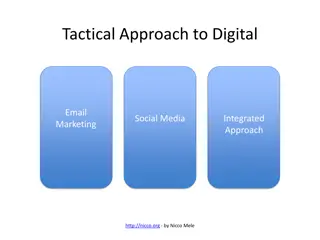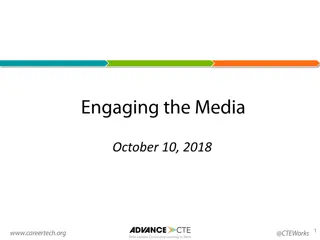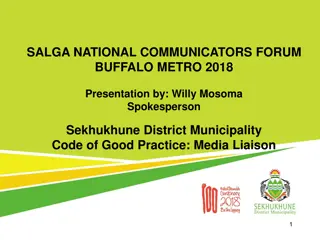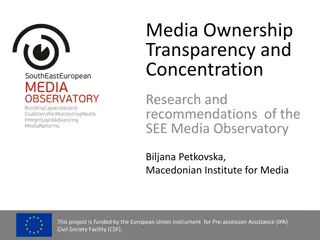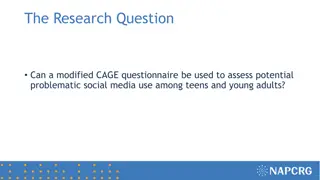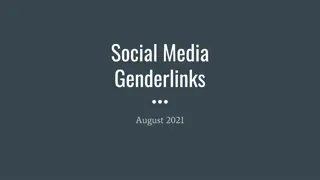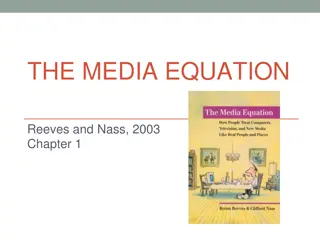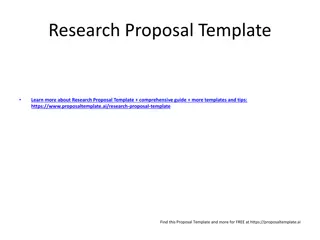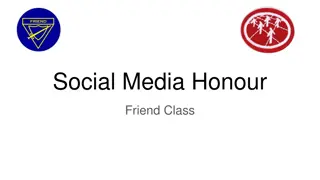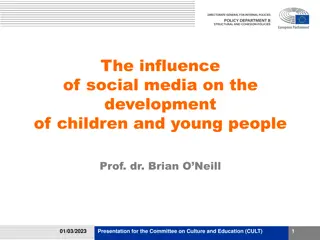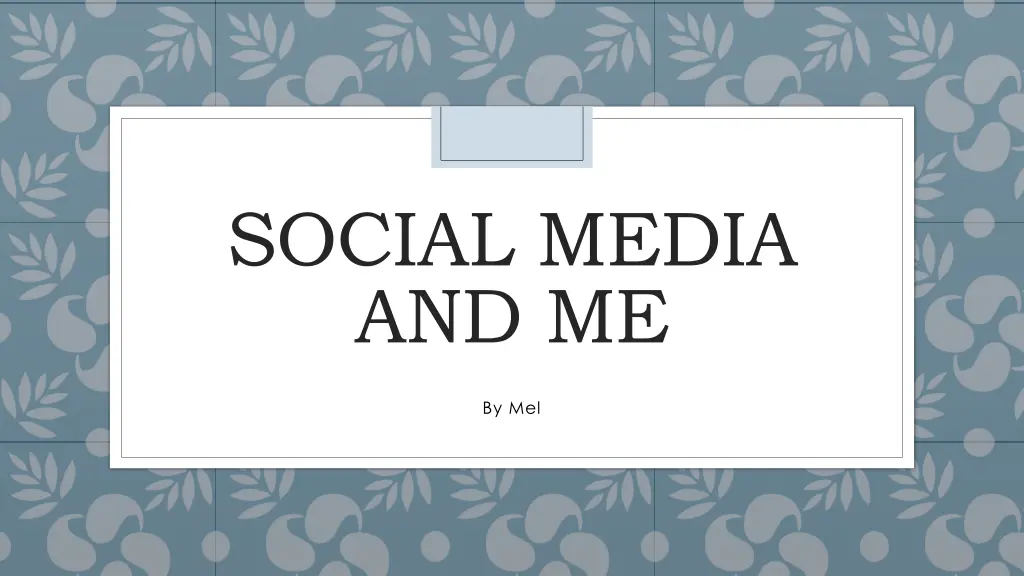
Impact of Social Media on Information Consumption and Youth Culture
Discover how social media influences information consumption, the importance of fact-checking in a world of biased information, the benefits and drawbacks of online social interactions, and the toxic impact of social currency on youth culture. Dive into the connections between real life and the themes depicted in Black Mirror episodes.
Download Presentation

Please find below an Image/Link to download the presentation.
The content on the website is provided AS IS for your information and personal use only. It may not be sold, licensed, or shared on other websites without obtaining consent from the author. If you encounter any issues during the download, it is possible that the publisher has removed the file from their server.
You are allowed to download the files provided on this website for personal or commercial use, subject to the condition that they are used lawfully. All files are the property of their respective owners.
The content on the website is provided AS IS for your information and personal use only. It may not be sold, licensed, or shared on other websites without obtaining consent from the author.
E N D
Presentation Transcript
SOCIAL MEDIA AND ME By Mel
How does social media change the way we consume information? We have faster connections to the news and media. Less fact checking, misleading information. Biased info, not showing everyone's sides and exaggerating information. Algorithms not letting people see other points of view/opinions. Before we had social media and advanced technology it took longer to obtain information because we couldn t just search it up. We had to read books, textbooks, news papers, listen to the radio or find things on televised news.
When you see or read news on social media, do you take time to research the story further? Yes I do take time to research stories. When I go out of my way to research a story I saw online is usually because I think it is untrue or exaggerated, other times its because I m interested in the story and I want to learn more about it because its important to me.
What value do you get from online social interactions? It has some negative value because people can be mean on the internet because they don t know you in person/they aren t face to face with you so they can easily be rude without being concerned about the consciences in person, people can also be very passive aggressive over text which can be draining if you overthink a lot, tons of offensive things like racism, homophobia, body shaming, triggering things for people with ptsd/trauma etc. It also has positive value like people being kind and complimenting people on their posts, posting funny pet videos, people posting about nature and happy news stories rather than the regular negative news stories, people coming together to start movements online, making groups for playing games, memes etc.
Describe the role of social media and social currency and how it is shaping youth culture? Social Media is shaping youth culture by being added to majority of teens daily routines. For example: waking up and immediately checking social media, checking it in school, before bed. The role of social currency with teenagers is very toxic because it lowers self esteem of many teens if they don t get enough followers/likes on their account and posts. Some get bullied for not having enough likes or followers which can be very exhausting and cause them to delete posts or their whole account.
Explain connections to Black Mirror episode I do see similarities between the show and in real life because sometimes people judge others by how many likes they have or followers and its like social value basically. My social interactions wouldn t change much I am often nice to people. The character in the show loses points when she associates with people with lower points or if she is weird or unkind. The points are important to her because she gets better opportunities and she's allowed to associate with people with 5 stars, She probably also wants everyone's approval very badly.
I usually tell the difference between facts, interpretations, opinions and judgements by checking who said it and the history of things they ve said and if they have a reputation of spreading false information or factual information, If I have trouble identifying from that I usually go to google and search if what they said is true from websites that can be trusted to give factual info.
Black Mirror, Nosedive, Trecho. www.youtube.com, https://www.youtube.com/watch?v=GQW6mUK2aDQ&list=PLJk1a 21GKEZXxT9wwmnVle-zautJw4q12&index=2. Accessed 5 Apr. 2022. Horgan, Colin. Confusion Is the Point. GEN, 16 Oct. 2019, https://gen.medium.com/the-confusion-is-the-point- 6ab1d5a933aa. Is Social Media Hurting Your Mental Health? | Bailey Parnell | TEDxRyersonU. www.youtube.com, https://www.youtube.com/watch?v=Czg_9C7gw0o. Accessed 5 Apr. 2022. Kindness May Not Deserve Kind Return. www.youtube.com, https://www.youtube.com/watch?v=tyUi6-Opzzw. Accessed 5 Apr. 2022. You Are What You Share. www.youtube.com, https://www.youtube.com/watch?v=UyWwX_VzIBY. Accessed 5 Apr. 2022. Citations

